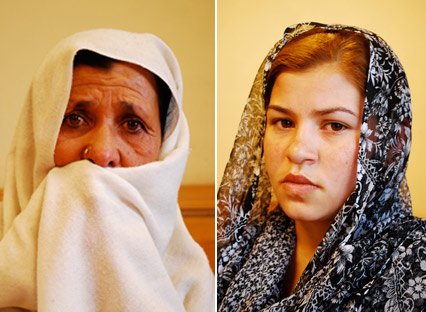By Bahman Boman
Zaiba, 18, didn't need to see the cover of Time magazine to know what happens to women who flee an arranged marriage or an abusive husband.

This woman (above left) was a failed suicide bomber, sentenced to 4 years. Shahperai (above right) a 22-year-old woman sentenced to 15-year for fleeing from a cruel husband.
"My life is destroyed now," said Shahperai. "When they announced in court that I have 15 years I was happy, because I have nowhere to go. At least I am safe here."
The First Post, Nov. 16, 2010
While the world may have been shocked by the image of a 20-year-old woman simply known as Aisha who had her nose and ears cut off by her father-in-law after fleeing her violent Taliban husband, Zaiba understood the risk she faced when she ran away from home to escape an arranged marriage in order to wed the man she loved.
"My father wanted to marry me off to my uncle's son, who is 40 and already has a wife and kids. Actually, he wanted to sell me" for $15,000, she said. "My boyfriend and I decided to run away and solve the problem through the judicial institutions."
Zaiba found sanctuary in a refuge for women in the northern city of Mazar-e Sharif, where she has been staying for the last two months.
Her father, Nuruddin, 80, was invited to the safe house to see whether he and his daughter could come to some agreement. He staunchly denies blocking Zaiba's wish to marry her boyfriend.
"If this guy had come along with four elders and asked for my daughter's hand in marriage, why wouldn't I have let her marry him?" he said. But, he added, "Now he has sullied my name, so there is no way I will let my daughter marry him."
Hamid Safowat heads the Afghanistan Assistance group that helps run the shelter in Mazar-e Sharif. There are currently 31 women and girls in the shelter. Safowat said that since it opened in 2006, the shelter has provided refuge for more than 1,400 runaways in the northern provinces of Baghlan, Samangan, Balkh, Jowzjan, Sar-i Pol and Faryab.
In conservative Afghan society, many decisions about a woman's future are taken by male family members. Observers say customary law takes precedence over Islamic law, which gives women the right to choose their own husband and forbids forced marriage.
Qazi Sayed Mohammad Samay, who heads the northern branch of Afghanistan's Human Rights Commission, said the number of girls running away from home has risen in recent years. Samia, 16, from the Shulgard district of Balkh province, is among those seeking the commission's help. She wants it to intervene and help break her engagement to a 38 year old. Her family actually arranged the marriage when she was 6 and is now insisting the nuptials take place.
"I don't want to marry someone who's many times my age, so I have come to this (human rights commission) office to get the engagement terminated," she said.
Under Afghan law, women and girls who run away from home can be put in prison for up to a year. Due to the shame associated with such cases, families sometimes disown the women.
Fawzia Nawabi, head of the women's department at the national Human Rights Commission, said that on a recent tour of women's prisons, she met 15 girls imprisoned for running away from home in Balkh province, 22 in Jowzjan, eight in Sar-i Pol province and four in Samangan.
"All of them said they had been married off against their will," she said. "Some of them had run away because they were beaten for no reason, and others because they had been given away as 'baad.'" "Baad" is an Afghan custom where girls are given in marriage in exchange for debts owed to the other family, or as compensation for a death.
Samay with the regional Human Rights Commission agreed "baad" was one of the factors driving women to flee their homes, along with poverty and low levels of literacy.
But he also claimed that foreign media was giving girls unrealistic expectations and reducing the influence of the family. He called for an end to such "intrusions of foreign culture."
Malalay Roshandil Osmani, head of the Balkh Association for the Defense of Women's Rights, disagreed. She agreed that young women were increasingly influenced by foreign media since the fall of the Taliban in 2001, but said such consciousness only made them more aware of their rights and potential.
"Awareness of their rights has fostered a new spirit of daring among women, leading them to run away from home," she said.
There are signs that things may be slowly changing in Afghanistan. Recently, the man accused of cutting off Aisha's nose and ears was arrested and is currently in prison.
Bahman Boman is a reporter in Afghanistan who writes for The Institute for War & Peace Reporting, a nonprofit organization that trains journalists in areas of conflict. Readers may write to the author at the Institute for War & Peace Reporting, 48 Grays Inn Road, London WC1X 8LT, U.K.; Web site: www.iwpr.net. For information about IWPR's funding, please go to http://www.iwpr.net/index.pl?top-supporters.html.



